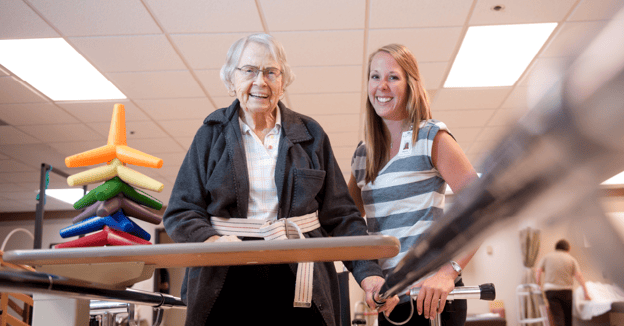Addressing and Debunking Myths About Assisted Living
Sarah Benbow, Executive Director of Communications | Jun 13, 2023

Assisted living is a type of care that provides housing, meals, and supportive services for seniors who need help with daily activities. Despite general misconceptions and stereotypes about senior living, assisted living promotes independence, socialization, and wellness in a safe and comfortable environment.
Whether you or a loved one is considering assisted living, it can be overwhelming to think about what that next chapter holds. We’ve created a list of common assisted living stereotypes and stories that help share the truth and benefits of these communities.
MYTH: Assisted Living Means Giving Up Independence

The idea that assisted living means giving up independence is a myth because, in reality, these communities are designed to support seniors in living as independently as possible. While assisted living facilities offer various services to help seniors with daily activities and medical needs, they also encourage residents to maintain their autonomy and personal preferences.
For example, residents may have private apartments or suites and can often bring furniture and decorations. Based on their interests and abilities, they can participate in various activities and events, such as exercise classes, arts and crafts, and outings.
Assisted living staff also work with residents to develop personalized care plans prioritizing their unique needs and goals. This can lead to a better quality of life, improved health outcomes, and greater overall satisfaction.
MYTH: Assisted Living Is Only for People With Memory Issues or Dementia

Assisted living is not only for people with memory issues or dementia. While some communities offer specialized memory care services, most typically provide assistance with activities of daily living (ADLs), medication management, transportation services, meal preparation, housekeeping, and social and recreational activities.
Many seniors struggling with mobility, chronic conditions, or other challenges choose assisted living as a proactive step to maintain their independence and quality of life as they age. They may appreciate the social and recreational opportunities, freedom from home maintenance, and access to on-site health and wellness services that assisted living communities provide.
MYTH: Assisted Living Is Too Expensive

The truth is, assisted living can cost nearly the same or less than receiving similar care services at home. General costs for assisted living can range from a few thousand dollars per month to more than $10,000, but it all depends on factors like location, level of care required, and amenities and benefits.
It’s also important to note that there are many resources available to help seniors and their families afford care costs, including:
- Medicaid: Many states offer Medicaid programs that cover the cost of assisted living for eligible seniors with low incomes.
- Veterans Benefits: Veterans and their spouses may qualify for financial assistance through the Department of Veterans Affairs to help pay for assisted living.
- Long-Term Care Insurance: Some seniors may have long-term care insurance policies that cover some or all of the cost of assisted living.
- Social Security Benefits: Seniors who receive Social Security benefits may be able to use these funds to help pay for assisted living.
- Shared Living: Some assisted living facilities offer shared living arrangements, where two or more residents share a room to reduce the overall cost.
- Negotiation: Families may be able to negotiate the cost of assisted living with the facility, especially if they are willing to sign a long-term contract.
- Tax Deductions: Seniors or their families may be able to deduct some of the cost of assisted living on their taxes if they meet certain criteria.
MYTH: Assisted Living Facilities Are Depressing and Institutional

Assisted living facilities are often perceived as depressing and institutional, but this is not necessarily true. Many modern assisted living facilities provide a comfortable, engaging, and supportive environment for seniors to age in place with dignity and independence. As we like to say, there's so much life happening here!
By design, assisted living communities offer a home-like environment with lots of amenities and social activities to promote an engaging lifestyle for residents. They also offer a sense of community and connection that can benefit seniors who may otherwise feel isolated or alone. And with round-the-clock support from trained team members, residents always have someone to care for them.
MYTH: Assisted Living Staff Are Uncaring and Unqualified

The myth that assisted living staff are uncaring and unqualified is invalid for most facilities. In fact, many assisted living communities have strict hiring standards and provide extensive training to their staff to ensure they are qualified to provide quality care to their residents.
Here are a few examples to prove this:
- Training and Certification: Many assisted living facilities require their staff to complete specialized training and certification programs to ensure they have the skills and knowledge necessary to care for seniors. These programs cover medication management, communication skills, and infection control.
- Care Planning: Assisted living staff work with residents and their families to develop personalized care plans prioritizing their unique needs and preferences. This individualized approach ensures that residents receive the care and support they need to maintain their independence and quality of life.
- Emotional Support: Assisted living staff provide not only physical care but also emotional support to their residents. They take the time to get to know each resident personally, forming meaningful relationships and providing comfort and reassurance when needed.
- Feedback and Improvement: Many assisted living facilities have mechanisms for residents and their families to provide feedback on the care they receive. This feedback is used to improve the quality of care and ensure that staff members meet the needs and expectations of residents and their families.
Tips for Overcoming Assisted Living Stereotypes

Helping loved ones overcome myths about assisted living can be a challenging task, but several strategies can be helpful:
Start the Conversation Early
Don't wait until a crisis or health issue arises before discussing assisted living options with your loved ones. Start talking about it while your loved ones are still independent and can make their own decisions about their future care.
Openly Address Concerns
Listen to your loved ones' concerns and address them head-on. Talk about the benefits of assisted living and address any misconceptions they may have.
Share Stories
Share stories of positive experiences that others have had in assisted living communities. This can help alleviate fears and concerns and provide your loved ones with a more accurate picture of life in an assisted living community.
Visit and Tour Communities
Take your loved ones on tours of local assisted living facilities to help them see the options available. Encourage them to ask questions and talk to staff members and residents to better understand what life in a community is like.
Include Them in the Decision-Making Process
Make sure your loved ones feel involved in the decision-making process and that their preferences and needs are considered. This can help to alleviate fears and make the transition to assisted living easier.
Assisted Living Communities Near the Twin Cities
Walker Methodist is a faith-based, non-profit senior living organization that has been serving older adults since 1945. We offer several assisted living communities in Minnesota and Wisconsin for those seeking general, memory, and respite care.
Each community is staffed with the best and brightest individuals who are truly passionate about caring for older adults. Not only is the experience and commitment of our team unmatched, but our expansive list of senior care options is ever-evolving. When we say, "Our mission is life. And all the living that goes with it," we mean it.
If you're considering assisted living, we'd be happy to help you learn more about your options.

